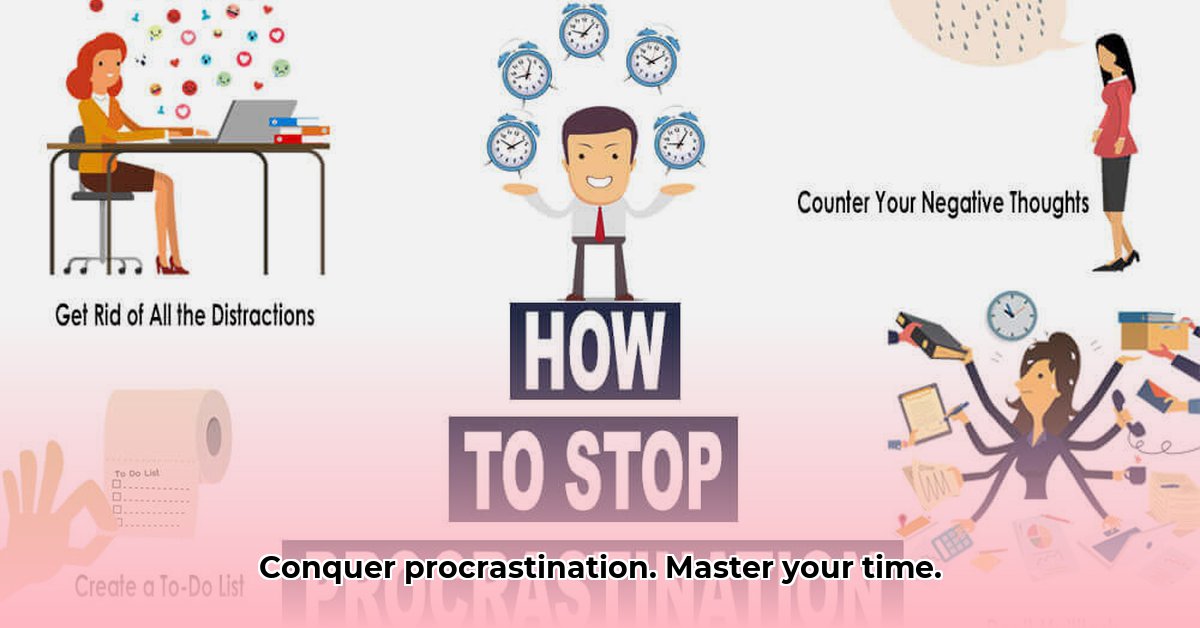Tired of missed deadlines and feeling overwhelmed? This comprehensive guide provides actionable strategies to break free from procrastination, master time management, and boost your productivity. Learn to understand why you procrastinate, implement practical techniques, and build a personalized plan for lasting change.
Understanding Procrastination & Time Management
Procrastination is a pervasive challenge affecting individuals across all walks of life. This guide provides a roadmap to conquering procrastination and becoming a time management master, leading to increased focus, reduced stress, and improved overall productivity.
Unveiling the Roots of Procrastination: Why We Delay Tasks
Procrastination is more than simple laziness; it’s a complex interplay of emotions, thoughts, and behaviors. Common underlying factors include:
- Fear of Failure: A paralyzing fear of not meeting expectations or producing subpar work.
- Task Aversion: Disliking the task itself, finding it boring, tedious, or unpleasant.
- Perfectionism: An unrealistic desire for flawlessness, leading to analysis paralysis and inaction.
- Lack of Motivation: Feeling uninspired or disconnected from the task’s purpose or benefits.
- Underlying Anxiety: Generalized anxiety or specific anxieties related to performance or outcomes.
- Decision Paralysis: Getting stuck in the details and becoming overwhelmed.
Recognizing these emotional and psychological roadblocks is the crucial first step toward overcoming procrastination.
Powerful Time Management Techniques: Your Arsenal Against Delay
Effective time management empowers you to accomplish more with less stress and increased efficiency. Here are proven techniques to combat procrastination and reclaim control of your time:
- The Pomodoro Technique: Focused Sprints for Maximum Output: Work in focused, 25-minute sessions (Pomodoros) followed by short, 5-minute breaks. After four Pomodoros, take a longer, 20-30 minute break. This technique helps maintain concentration, prevents burnout, and creates a sense of momentum.
- The Eisenhower Matrix (Urgent/Important): Prioritize Like a Pro: Categorize tasks based on their urgency and importance to prioritize effectively:
- Urgent and Important: Tackle these tasks immediately. These are the critical items that demand your immediate attention.
- Important but Not Urgent: Schedule these tasks for later. These are the strategic tasks that contribute to long-term goals.
- Urgent but Not Important: Delegate these tasks if possible. These are often interruptions or distractions that can be handled by others.
- Neither Urgent nor Important: Eliminate these tasks altogether. These are time-wasters that offer little to no value.
- Task Breakdown: Conquer the Goliath: Deconstruct large, daunting projects into smaller, more manageable tasks. This makes the overall project less intimidating and provides a sense of accomplishment as you complete each smaller step.
- Time Blocking: Structure Your Day for Success: Allocate specific time slots in your calendar for specific tasks or activities. This builds structure, reduces decision fatigue, and ensures that you dedicate time to your most important priorities.
- The Two-Minute Rule: Instant Action for Small Tasks: If a task takes less than two minutes to complete, do it immediately. This prevents small tasks from accumulating and becoming overwhelming.
- Eat the Frog: Tackle the Toughest Task First: Start your day by tackling your most challenging or dreaded task. This gets it out of the way early and frees up mental energy for the rest of the day.
- Parkinson’s Law: Set Realistic Deadlines: Be aware that work expands to fill the time available for its completion. Set realistic deadlines for your tasks to create a sense of urgency and prevent procrastination.
Emotional Regulation: Addressing the Inner Critic
In addition to time management techniques, addressing the emotional and psychological roots of procrastination is essential for lasting change.
- Self-Compassion: Treat Yourself with Kindness and Understanding: Practice self-compassion instead of self-criticism. Recognize that everyone makes mistakes and experiences setbacks. Treat yourself with the same kindness and understanding that you would offer a friend.
- Mindfulness: Cultivating Present Moment Awareness: Use mindfulness techniques like meditation or deep breathing to focus on the present moment and identify procrastination triggers. This allows you to respond to these triggers with awareness and intention, rather than automatic avoidance.
- Anxiety Management: Calming the Inner Storm: Implement stress-reducing techniques like deep breathing exercises, progressive muscle relaxation, or yoga to ease anxiety and improve focus.
- Cognitive Reframing: Challenge Negative Thoughts: Identify and challenge negative thought patterns that contribute to procrastination. Replace these negative thoughts with more realistic and positive ones.
- Acceptance and Commitment Therapy (ACT): Embrace Discomfort: Learn to accept uncomfortable feelings and commit to taking action despite them. This helps you break free from the cycle of avoidance and move towards your goals.
Building Your Personalized Procrastination-Busting Plan
Transform these strategies into actionable steps to stop delaying important work, improve focus, and develop sustainable time management habits:
- Identify Your Procrastination Patterns: Keep a journal or log to track your procrastination habits, including the triggers, thoughts, and feelings that precede them.
- Choose Your Time Management Tools: Select two or three time management techniques that resonate with you and that you believe will be most effective for your specific needs and challenges.
- Incorporate Emotional Regulation Strategies: Choose one or two emotional regulation techniques to help you manage the emotional and psychological factors that contribute to your procrastination.
- Schedule Task Time: Block out specific time slots in your calendar for working on your most important tasks. Treat these appointments as non-negotiable.
- Establish Accountability: Share your goals and progress with a trusted friend, family member, or mentor who can provide support and encouragement.
- Monitor Your Progress and Adjust as Needed: Regularly review your progress and make adjustments to your plan as needed. This is an ongoing process of experimentation and refinement.
- Celebrate Your Wins: Acknowledge and celebrate your successes, no matter how small. This reinforces positive behavior and helps you stay motivated.
Tackling Common Roadblocks: Overcoming Obstacles to Progress
Here’s how to navigate common challenges that can derail your efforts to overcome procrastination:
| Obstacle | Solutions |
|---|---|
| “I don’t have enough time.” | Prioritize using the Eisenhower Matrix, delegate tasks when possible, and learn to say “no” to non-essential commitments. |
| “I get distracted easily.” | Minimize distractions by turning off notifications, finding a quiet workspace, and using website blockers or focus apps. |
| “I feel overwhelmed.” | Break down tasks into smaller, more manageable steps, celebrate small wins, and use the Pomodoro Technique to manage overwhelm. |
| “I lack motivation.” | Connect your tasks to your values and goals, reward yourself for progress, and seek out inspiration or support from others. |
| “I’m afraid of failure.” | Challenge negative thought patterns, practice self-compassion, and reframe failure as an opportunity for learning and growth. |
| “I don’t know where to start.” | Identify the very first step you need to take and focus on completing that one small action. |
Maintaining Momentum: The Long Game of Productivity
Overcoming procrastination is a journey, not a destination. It requires patience, persistence, and a willingness to adapt your strategies as you learn what works best for you. Celebrate small victories, learn from setbacks, and consistently strive to refine your approach. Remember that consistent progress, not perfection, is the key to unlocking your full potential and achieving your personal and professional goals.
How to Overcome Procrastination Caused by Anxiety and Perfectionism
Key Takeaways:
- Perfectionism and procrastination create a self-defeating cycle of avoidance, anxiety, and self-criticism.
- Strategies for breaking this cycle include reframing your thinking, setting realistic goals, practicing self-compassion, and utilizing effective time management techniques.
- Consistent effort and a willingness to adapt your approach are essential for lasting change.
Understanding the Problem at its Core
Struggling with how to overcome procrastination caused by anxiety and perfectionism? This toxic combination can create a vicious cycle that sabotages your productivity and undermines your self-esteem. Perfectionism leads to a crippling fear of failure, which in turn triggers procrastination as a way to avoid the perceived pain of not meeting impossibly high standards. This procrastination then fuels more anxiety and self-criticism, perpetuating the cycle.
Practical Strategies for Breaking the Cycle of Inaction
Here’s how to reclaim your time, productivity, and peace of mind:
- Reframing Your Thinking: Challenge negative self-talk and replace perfectionistic demands (“I must be perfect”) with more realistic and compassionate statements (“I’ll do my best, and that’s enough”).
- Setting Realistic Goals: Break projects into manageable steps with achievable deadlines. Avoid setting unrealistic expectations that set you up for failure.
- The Pomodoro Technique: Work in focused bursts (25 minutes) with short breaks to maintain concentration and prevent overwhelm.
- The Eisenhower Matrix (Urgent/Important): Prioritize tasks based on their urgency and importance, focusing on what truly matters.
- Self-Compassion: Treat yourself with kindness, understanding, and forgiveness when you make mistakes or fall short of your expectations.
- Mindfulness: Practice present moment awareness to reduce anxiety and focus on the task at hand.
- Seeking Professional Help: Consider seeking therapy or counseling if anxiety and perfectionism are significantly impacting your life.
- Building a Personalized Action Plan: Integrate these strategies into a tailored plan to overcome procrastination.
Addressing Inevitable Obstacles
Prepare for these inevitable challenges and develop coping mechanisms:
- Lack of Time: Implement time blocking to allocate specific time slots for tasks, and identify time wasters to eliminate.
- Distractions: Minimize distractions by turning off notifications, creating a dedicated workspace, and using website blockers.
- Feeling Overwhelmed: Return to small, manageable steps, celebrate each completion, and practice self-compassion.
Maintaining Momentum Towards Success
Breaking free from the cycle of anxiety-driven procrastination requires consistent effort, celebrating progress (no matter how small), and refining your strategies over time. Remember that setbacks are normal and that progress, not perfection, is the ultimate goal. Effective strategies lead to improved focus and create actionable steps to achieve lasting change.
Future-Proofing Your Time Management Skills- Essential Strategies for Long-Term Success
Key Takeaways:
- Effective time management is an ongoing process that integrates planning, prioritization, execution, and mindful reflection.
- Daily and weekly planning, prioritizing tasks with the Eisenhower Matrix, and minimizing distractions are crucial habits.
- Breaking down large projects into manageable chunks and utilizing structured work periods (e.g., the Pomodoro Technique) boost productivity.
- Self-care, including adequate sleep, a healthy diet, and regular exercise, is essential for maintaining cognitive function and preventing burnout.
- Regular review and adjustment of your time management system are necessary to adapt to changing priorities and challenges.
Understanding Procrastination’s Persistent Grip
Procrastination is often rooted in fear, anxiety, and perfectionism, creating a cycle of overwhelm, avoidance, and self-criticism. Learning to recognize and address these underlying emotional factors is essential for breaking free and achieving your goals, improved focus, and enhanced time management skills.
Mastering Time: Practical Strategies for a Productive Life
- The Power of Planning: Plan your day or week in advance, prioritizing tasks using the Eisenhower Matrix to focus on what truly matters.
- Embrace the Pomodoro Technique: Work in focused bursts (25 minutes) with short breaks to maintain concentration and prevent burnout.
- Break It Down: Divide large projects into manageable chunks to make them less intimidating and easier to tackle.
- Minimize Distractions: Schedule specific times to check social media and email, and turn off notifications to minimize interruptions.
- Prioritize Ruthlessly: Distinguish between urgent and important tasks, and focus your energy on the latter.
- The Art of Delegation: Delegate tasks to others when possible to free up your time and energy for your most important priorities.
- Self-Care for Productivity: Prioritize sleep, a healthy diet, and regular exercise to enhance cognitive function, reduce stress, and improve your overall well-being.
- Regular Review and Adjustment: Adapt your time management system as needed to accommodate changing priorities, challenges, and opportunities.
Conquering Procrastination’s Psychological Barriers
Practice self-compassion, challenge negative thought patterns, and develop strategies to manage anxiety and stress. Addressing these psychological barriers will improve your mental health and make it easier to overcome procrastination.
Building a Personalized Action Plan
Reflect on your strengths and weaknesses, start small, and track your progress to achieve lasting changes. Remember, future-proofing your time management skills is a continuous journey of learning, adaptation, and self-improvement.
Community-Verified Tips for Beating Procrastination
Key Takeaways:
- Procrastination often stems from underlying emotional avoidance, such as fear of failure or anxiety about the task.
- Breaking down tasks into smaller, more manageable steps simplifies the process and reduces feelings of overwhelm.
- Accountability, whether through sharing your goals with others or using tracking tools, is crucial for staying on track.
- Mindfulness practices, such as focusing on the present moment, can help you overcome procrastination triggers and maintain focus.
Understanding Your Procrastination Triggers
Procrastination is often linked to underlying emotions, such as fear of failure, perfectionism, or anxiety. Recognizing these feelings and identifying your personal procrastination triggers is the first step toward conquering procrastination.
Task Management Techniques: Your Arsenal Against Delay
Here are some Community-Verified Tips for Beating Procrastination that you can incorporate into your daily routine:
- The Two-Minute Rule: If a task takes less than two minutes to complete, do it immediately to prevent it from lingering on your to-do list.
- Time Blocking: Schedule specific times for working on particular tasks or projects to create structure and minimize distractions.
- The Pomodoro Technique: Work in focused bursts (25 minutes) with short breaks (5 minutes) to maintain concentration and prevent burnout.
- Task Breakdown: Divide large projects into smaller, more manageable steps to make them less intimidating and easier to tackle.
- The “Eat the Frog” Method: Tackle your most challenging or dreaded task first thing in the morning to get it out of the way and set a positive tone for the day.
Mastering Your Mindset: Cultivating Self-Compassion and Resilience
Practice self-compassion by treating yourself with kindness and understanding, especially when you make mistakes or experience setbacks. Remember that self-compassion is not self-indulgence; it is a crucial tool for building resilience and overcoming procrastination.
Accountability & External Pressure
Share your goals with friends, family, or a mentor to create a sense of accountability and increase your motivation to stay on track. Consider joining a study group or finding a “procrastination buddy” to support each other.
Technology: Your Productivity Ally or Your Worst Enemy?
Mindfully manage notifications and limit time spent on non-essential activities to stay focused and avoid distractions. Utilize technology to your advantage by using productivity apps, website blockers, and time-tracking tools.
Building a Personalized Action Plan
Experiment with different techniques to create a personalized plan that works best for your individual needs and preferences. Remember that overcoming procrastination is a process, not a destination. Celebrate your progress, learn from your setbacks, and keep striving to improve your focus and productivity.
- Mindfulness Exercises For Anxiety PDF To Reduce Stress - February 26, 2026
- Mindfulness Activities for Adults PDF for Stress Relief - February 25, 2026
- Mindfulness Techniques PDF Offers Free Exercises for Calm and Focus - February 24, 2026














